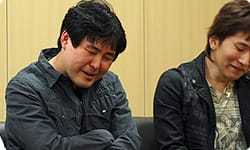Like Jazz Sessions
Yamagami-san and I had actually been talking for some time about making Sin & Punishment for the Wii console.
Huh? Really?!
Yeah. (laughs)
I was surprised when I got a reply a mere three days after submitting the proposal. It can take up to a few months to hear results, so I was telling these two to take it easy.
(nods)
When I received the proposal from Maegawa-san, I was really pleased with it, but I didn't get to discuss it with Iwata-san until three days later.
If I'd been able to meet with Yamagami-san the same day it arrived, I would have approved it that very day.
Really?!
(laughs)
Three days later, I went to Iwata-san in a state of elation. I was like, "It's here!", "Let's do it!"
Oh, I see.
That was how we here at Nintendo decided to do it, but what made you at Treasure decide to do a Wii version of Sin & Punishment?
Like I mentioned earlier...
The Wii Remote got you started.
The weapon that appears in this game is called a Cannon Sword. It's a gun and a sword, so slashing and shooting are the basic operations. We thought the Wii Remote was perfectly suited to those actions. I thought you could aim with the Wii Remote and use the Nunchuk to move the player character, so I started bugging these two about using that method for a Sin & Punishment sequel.
How did you feel about that Nakagawa-san?
As I mentioned before, I recalled my hardship with the Nintendo 64 game.
You'd been traumatized.
(nods in silence)
(laughs) You couldn't just dive right in.
Nope.
Maegawa-san, how did you convince him?
He had originally said he wanted to do it.
I wanted to, but...
He definitely didn't say he was against it.
(nods quietly)
Then, when I said, "Let's do it," he was like, "I want to, but it'll be hard, so just hold on a sec..."
It took a little time for him to come around. Suzuki-san, what did you think when they approached you about this project?
Actually, I hadn't been involved in video game production for some time. Development methods had changed so much, and making a new title or original had become so hard that I wouldn't have minded never making another video game.
I see.
I also work in illustration and manga. But since Nakagawa-san was going to be director, I thought it might be all right.
Why is that?
He knows the technology and works painstakingly hard, never giving up no matter what happens.
He sticks it out to the very end.
(shakes head no)
(laughs)
I told Treasure I definitely wanted Suzuki-san to participate. I knew he wasn't there anymore, but I wanted the sequel to preserve the taste of the original.
When you change designers, the style changes, resulting in a different game. That was something we couldn't let happen.
When Suzuki-san joined the staff, how did you kick off development?
I told Suzuki-san to draw whatever he wanted.
Huh? Is that really what you said?
We do that a lot at our company.
Yeah, a lot.
(nods agreement)
All the time.
(laughs) I think that's unusual for a director. This relationship is interesting to know that things don't fall apart working that way.
Drawing up detailed specifications and developing strictly in line with them is also all right. When you do that, the finished product will turn out fine, but it will hardly be anything more than what was in the specs.
Ah, I see.
Especially for action and shooting games that occur in real time, there's an element of running them to see what happens. First you've got to get them moving and actually try them out. As you make repeated improvements, they rapidly get better.
But, you know...we've known each other for quite a long time now. When we first started working together, I did request some very specific illustrations, but...
But?
He always gave me something completely different than I'd asked for!
(laughs)
In other words, it doesn't do any good to ask for anything specific? (laughs)
(nods)
I was just giving them my own little twist.
But that probably goes for me as well. When someone says, "Here, I made this model, now move it so it looks cool," as a programmer, I do it the way I want.
And it can be fun to see movement that wasn't specifically requested, right?
In other words, both designers and programmers ad lib off of each other, like, "Oh, that's what he did? Then I'll do this..."
Right, right.
Right, right.
It's like a jazz session. Is that how Treasure develops games, Maegawa-san?
I think that's exactly it. Unless each person is working independently in their own function, we never move forward.
That's why you always tell me to wait until it's done.



